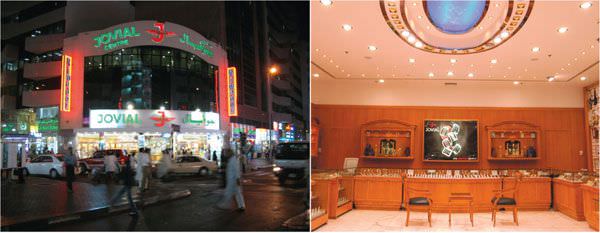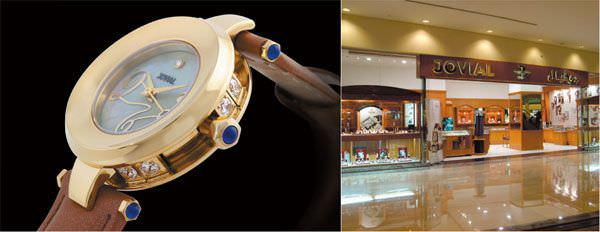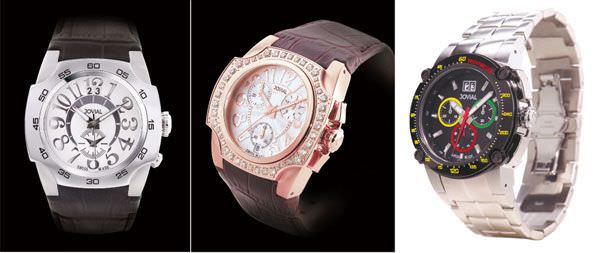1929 wasn’t a great year in the grand scheme of things – it was the year of the Great Depression, after all.
1929 was also the year in which watch brand Jovial was formed in La Chaux-de-Fonds. Later the brand moved to Bienne, where its headquarters are now located, but even back when the brand started, Jovial was specializing in the Middle Eastern market. Jovial, now coming up on 80 years of history, is still a specialist in the Middle East, but has set its sights firmly on expanding and becoming an international brand.
“Our main branch office is in Dubai and we have a total of 55 of our own showrooms in the Middle East that sell only Jovial products,” explains Jean-Claude Racine, President of the Board, Jovial. “The company’s main shareholder, Mohammad Dabaan, is from the Middle East and he has developed the region he knows so well.”
Jovial sells more than 60,000 watches a year and the company also has accessories like perfume, ties, sunglasses and some leather goods. In Jovial’s Middle Eastern showrooms, this entire range is on display. As a result of this wide presence, Jovial is a major player in the region.
“In the Middle East, Jovial is extremely well known,” Racine says. “We are the market leader in the middle range segment (US$300 – US$3,000 retail). We design our products for the Middle Eastern and world markets. Our mission is to supply the market with high quality watches corresponding to the present and future trends at a reasonable price.

"In the Middle East, Jovial stands out because of the design and the quality, as well as the price performance,” he continues. “Right now, we do over 70 per cent of our business in the Middle East. The people in the Middle East really want the Swiss Made label and our watches are 100 per cent Swiss Made. We will always respect our strategy of good quality at a reasonable price. We don’t have gold watches, even though we have steel watches set with genuine diamonds, because we don’t want to go to those high price points.”
Jovial has an in-house team of designers, both in Switzerland and in the Middle East. More and more, Jovial’s designs are expanding beyond the Middle East.
“We are now producing new models which are more ‘international’ in design and less decor-ative than what was the case for the Middle East,” Racine details. “The Middle Eastern taste is more flashy - they want colours, they want gold plated and they want diamonds, whereas the traditional markets are more conservative, with simpler shapes and not so flashy. Some of the new watches, like the 7000 series, fit the international markets particularly well, because they have great value for not such a high price.”
The challenge for Jovial is to take the success it has achieved in the Middle East and translate it into other international markets. It is not going to be easy, but it has to be easier than the uphill battle brand new watch companies face.

“We are in the process of opening new markets right now, to diversify our business and to increase our volume,” Racine says. “The biggest challenge in new markets is the brand name. People appreciate the quality of our watches, the price-value relationship and the design of the new collections, but the biggest hurdle is the name, which in some markets is still very little known. We definitely speak about our success in the Middle East, and this shows, especially with our own showrooms, that we have the financial capacity to expand into other markets. To a certain extent, our image in the Middle East helps us. Distributors have seen our presence and our showrooms and they are impressed by our brand and how popular we are in these markets. The biggest challenge is to inform people about the brand.”
Jovial is having some initial success, opening up distribution in Portugal, France, Spain, Italy and Greece. “We have a discreet presence in the United States right now and we want to increase our distribution there,” Racine says. “We are also in the South American market. In five years, Jovial will have a more important presence in the rest of the world, especially in markets which are developing quite strongly now, such as Eastern Europe, India, China and others. These markets offer a great growth potential. We definitely see that Eastern Europe is very important; we are already in place there. Europe is a big market and we are developing that now.”
Jovial is also developing more mechanical watches in their range, in response to worldwide demand. According to Racine, Jovial can ramp up its production of high quality quartz watches immediately, while the production of mechanical watches is very dependent on the availability of the movements, a problem the entire industry is facing.

The 7000 SERIES DOUBLETIME and CHRONOGRAPH, COLLECTION SPORTY 7000
With Jovial’s long history and relationships with key suppliers, the brand is able to keep prices down, choosing the right components and the right people to work with in Switzerland.
Jovial sees a bright future ahead as it adapts its collection to the international market, responding to market demands with new styles, new mechanical watches, while still maintaining the price-value relationship that has defined the brand’s success in the Middle East.
Source: Europa Star October-November 2008 Magazine Issue





